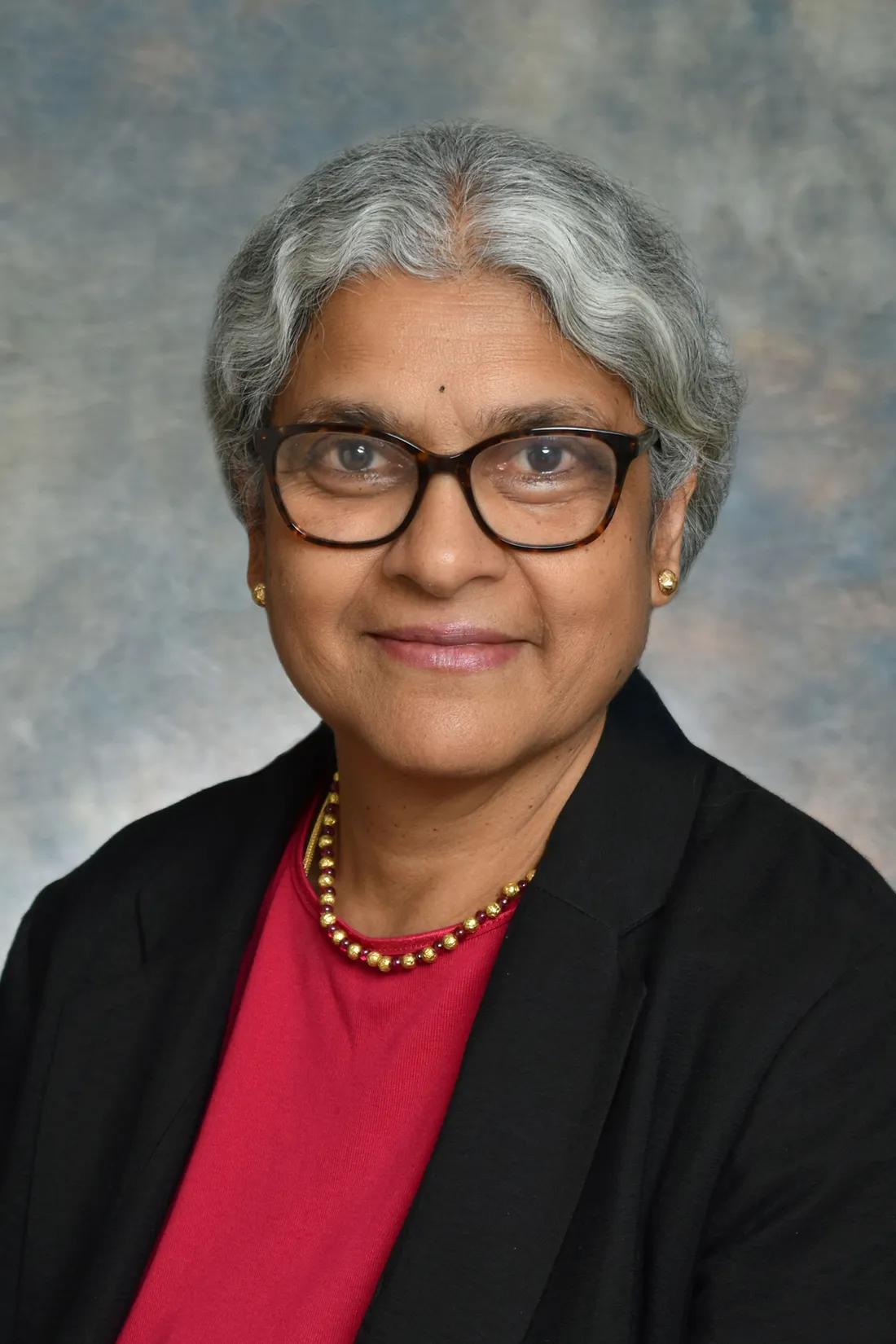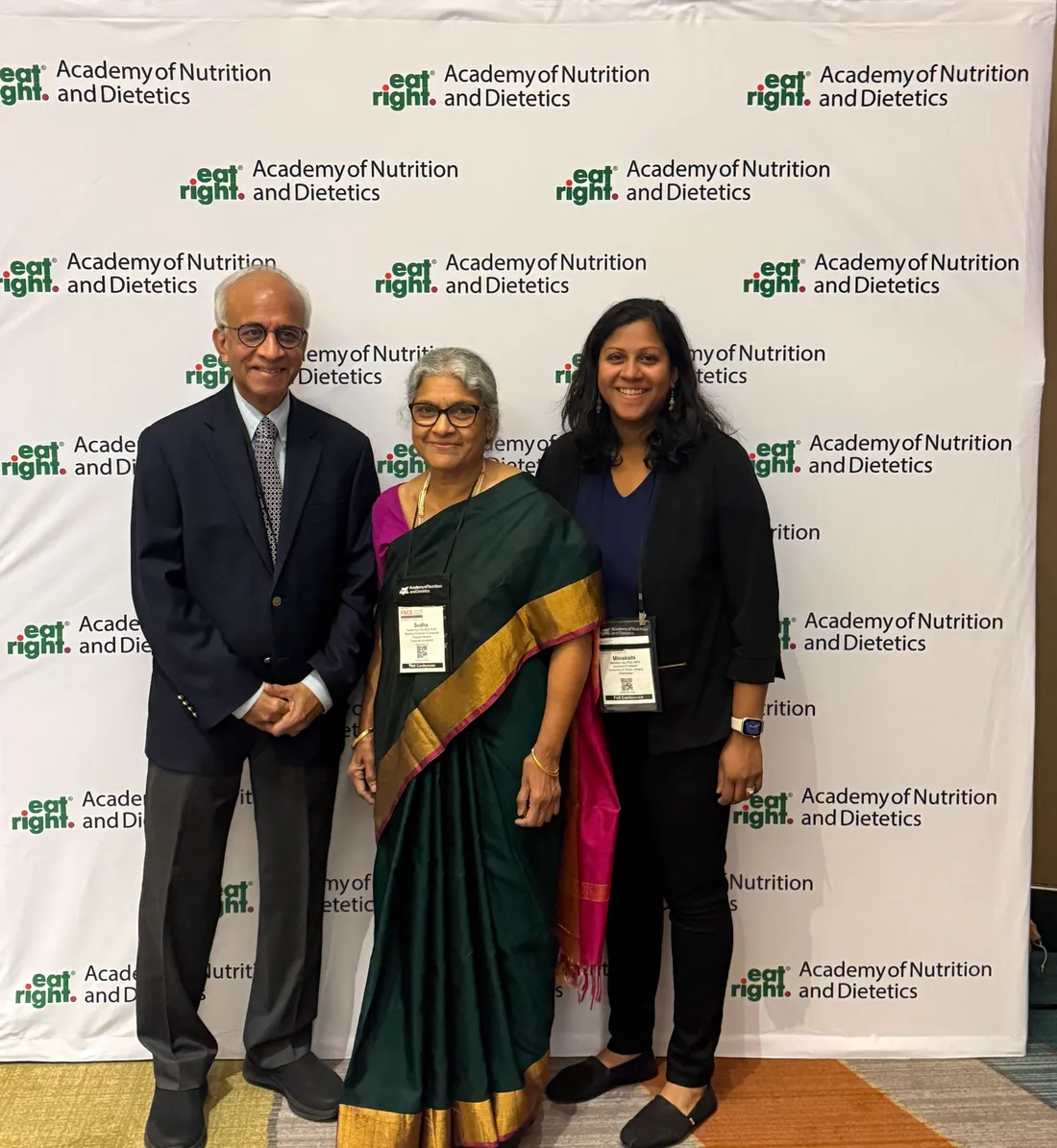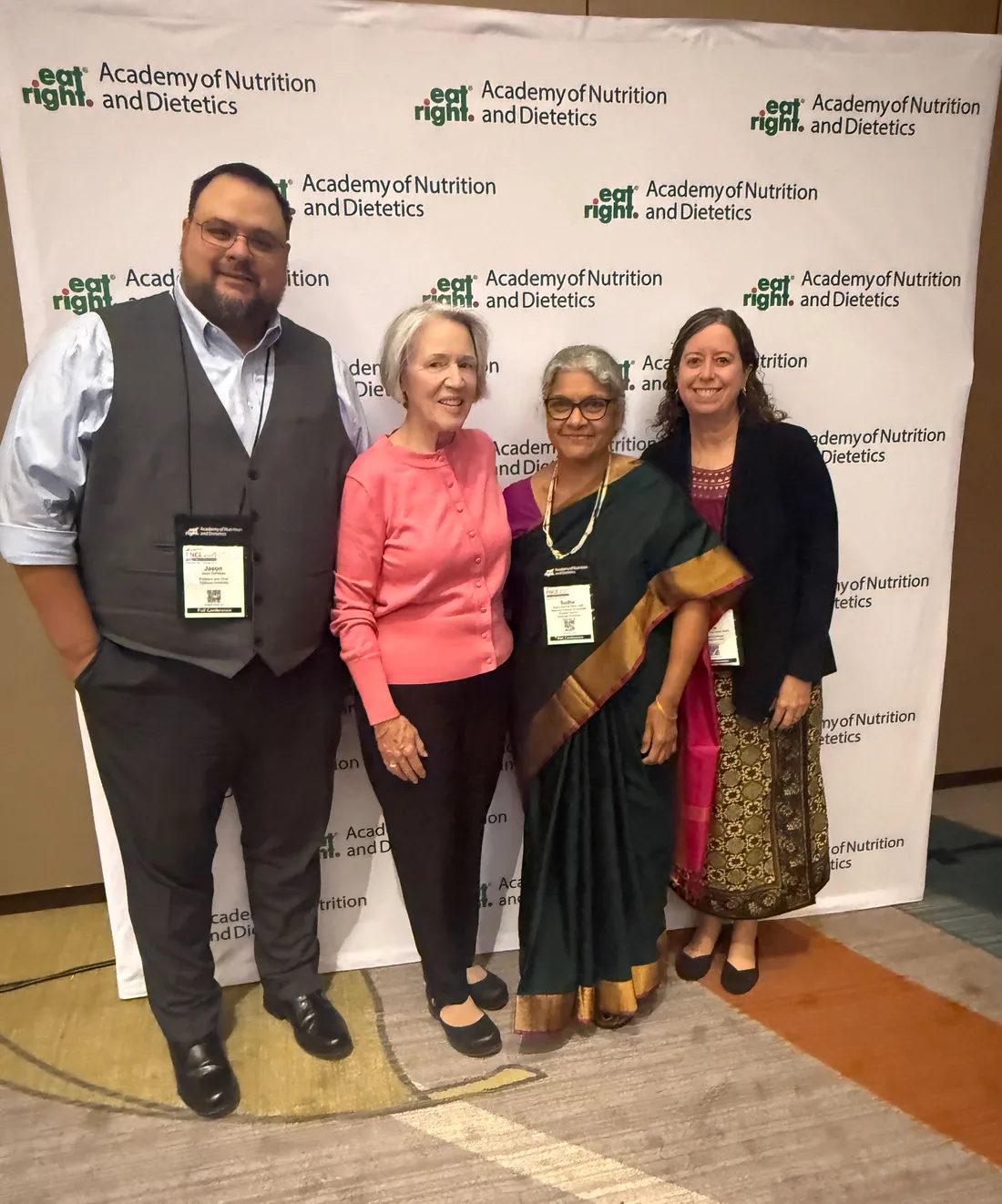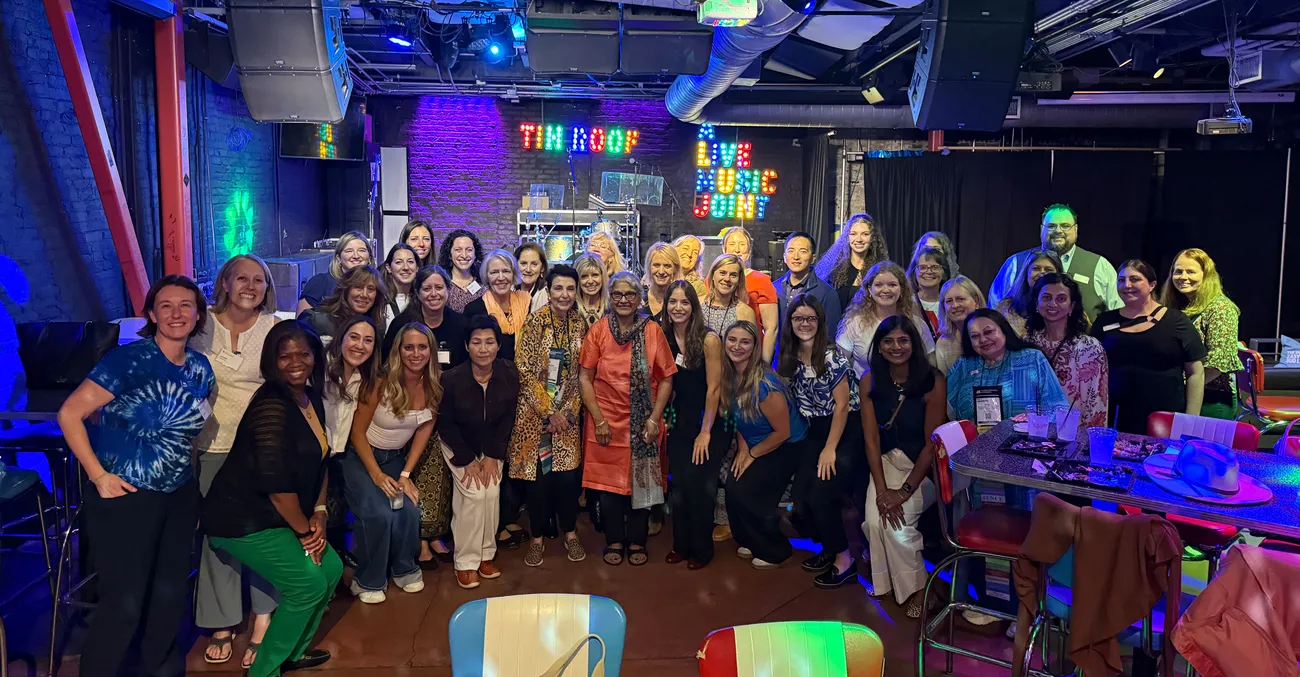
Sudha Raj
Growing up in India, Sudha Raj’s childhood dream was to become a physician. But there was one problem: She didn’t like the sight of blood.
But thanks to the influence of her parents and a friendly neighbor, Raj discovered a different way to help people by focusing her career on nutrition science and dietetics. She moved to Syracuse in 1981 to enroll at Syracuse University, and while she has never left Syracuse, she has made an enormous impact around the globe.
In particular, Raj is known worldwide for her studies to investigate dietary acculturation patterns of Asian Indian immigrants in the United States and her various leadership roles with the Academy of Nutrition and Dietetics, the world’s largest organization of food and nutrition professionals. And closer to home, she’s an award-winning teaching professor and researcher in the Department of Nutrition and Food Studies in the Falk College of Sport at Syracuse.
To recognize Raj’s groundbreaking contributions to the field of nutrition and dietetics, the Academy of Nutrition and Dietetics’ Board of Directors selected Raj as a recipient of the 2025 Medallion Award that was presented at an Honors Breakfast Oct. 12 during the Food & Nutrition Conference & Expo in Nashville, Tenn.
“Sudha has an inquiring mind and has mentored thousands of students to carry that quest for inquiry, but also cultivated a culture of integrity, purpose, and shared commitment to advancing the profession,” says Harlivleen “Livleen” Gill, who served as the 2024-25 president of the Academy of Nutrition and Dietetics. “Beyond her research and education, Dr Raj is known for her warmth, compassion and genuine connection with her colleagues and students.”
Nutrition and Food Studies Associate Professor Kay Stearns Bruening first met Raj when she joined the Syracuse University faculty in 1998, and Bruening says Raj is the first faculty member to receive a national award of this stature since the legendary Sarah “Sally” Short in the early 1990s.
“For her many professional, scholarly, and educational accomplishments at the local, national, and international level, and for her selfless generosity to making all of us who are privileged to know her better global citizens, I strongly recommend Dr. Sudha Raj for the Medallion Award,” Bruening wrote in her recommendation letter to the Academy of Nutrition and Dietetics’ Awards Committee.
Nutrition and Food Studies Associate Professor Lynn Brann joined the Syracuse faculty in 2003 and says Raj has brought her expertise in multiple areas to the department through new course development and her dedicated mentoring of undergraduate and graduate students.
“Seeing Sudha receive this award bring me joy,” Brann says. “Sudha has been thoughtful and deliberate to select areas of nutrition that are meaningful to her and that impact the population at large. I am inspired to follow her pursuit of advancing the profession.”
For her part, Raj says she was excited to receive the Medallion Award and mingle with the five other award recipients from around the country. But she sees the honor as a “team effort” because of the support she has received from her colleagues over the years.
“In the nutrition department we have the best colleagues to work with,” Raj says, “and a lot of things happened here (at Syracuse) through the Academy’s initiatives because my colleagues saw value in it.”
‘Ignite the Passion’

Sudha Raj’s husband, S.P. Raj, and daughter, Minakshi, joined Raj for the Medallion Award ceremony at the Food & Nutrition Conference & Expo in Nashville.
Raj’s father, M.R. Iyengar, was in the Indian military and her mother, Vijayalakshmi, “was particular about health because my father’s promotions always depended on good health and a good medical record,” Raj says. Raj’s mother also grew up on a farm and had seen the benefits of a healthy rural lifestyle.
When Raj was in the eighth grade, she met a new neighbor, Prema Sabapathy, who earned a master’s in food and nutrition from Madras University in India. In conversations with Raj and her family, Sabapathy often talked about the research and work she had done as a graduate student at the International Rice Research Institute in the Philippines.
“That was very fascinating because rice is our staple grain and how is it that something that I eat on a daily basis, someone is actually doing research on it?” Raj says. “She was a very important force in my life to ignite the passion in food and nutrition.”
As she was about to enter college, Madras University in India introduced a new degree in nutrition science and dietetics. So Raj received her bachelor’s degree from Madras and her master’s degree in foods, nutrition and dietetics from Bombay University (now the University of Mumbai).
In the meantime, Raj’s husband, S. P. Raj, had started teaching at Syracuse University and he sent his wife information about the nutrition program at Syracuse (S. P. Raj is now chair of the marketing department, Distinguished Professor of Marketing, and Director of the Snyder Innovation Management Center at the Whitman School of Management). Raj arrived in Syracuse in September 1981 and earned her master’s in nutrition science in 1985, and the Raj family–now including 2-year-old son Prithvi–spent the next year in Chicago while S.P. Raj was on a sabbatical at Northwestern University.
At that point, Raj wasn’t planning on pursuing a doctoral degree, but she received a letter from Syracuse asking if she would consider becoming a graduate teaching assistant for the food science course and enrolling as a doctoral student in the Nutrition Science Ph.D. program. She says she “jumped at the opportunity,” and it was a decision that ultimately altered her career trajectory.
Raj’s advisor for the program was Kate Clancy, an interdisciplinary scientist/nutritionist who joined Syracuse’s faculty in 1982 and had developed a graduate course on food systems. For her thesis, Raj worked with Clancy on a project to develop processing guidelines for organic foods, which hadn’t yet integrated into the mainstream food industry.
“For me, science was something to do with chemistry and biochemistry, but I realized there was a whole field and space of social science that I had not ventured into, and she introduced me to it,” says Raj, who gave birth to her second child, daughter Minakshi, two weeks after receiving her doctoral degree in May 1991.
Clancy, now a foods system consultant and Visiting Scholar at the Johns Hopkins Center for a Livable Future, says Raj was always a problem-solver at heart who cared about the wellbeing of others.
“As she moved much more into integrative medicine, that surely shows itself,” Clancy says. “She showed a continual interest in not only helping people but also bringing new ideas about knowledge and the necessity of broad thinking so nutritionists and dieticians can do their best jobs.”
‘To Teach and Mentor’

From left to right, Department of Exercise Science Professor and Chair and Department of Nutrition and Food Studies Chair Jason DeFreitas, Nutrition and Food Studies Associate Professor Kay Stearns Bruening, Sudha Raj, and Nutrition and Food Studies Associate Professor Lynn Brann gather for a faculty photo in Nashville.
With two young children at home and to balance her home life with her professional goals, Raj decided to at first work as an adjunct nutrition professor at Syracuse. It was at this time that she also started to get involved with the Academy of Nutrition and Dietetics, specifically with “Ethnic and Regional Food Practices: A Series,” a collection of booklets developed by the Academy to help healthcare professionals work with clients from diverse cultural backgrounds.
A booklet had yet to be produced for the Asian Indian population, and Raj proposed a booklet on how diets for Asian Indian immigrants change when they come to the United States. Her work was published in 1994 in the flagship Journal of the Academy of Nutrition and Dietetics as the first in-depth study to investigate the dietary patterns of Asian Indian immigrants.
“Sudha’s research has greatly advanced our understanding of nutrition and chronic disease prevention in the Asian Indian population,” says Gill, who met with Falk College nutrition students and faculty last April after Raj invited her to visit Syracuse University. “She was researching these dietary patterns and bringing them into the research arena to equip nutrition professionals to deliver inclusive and meaningful care for sustainable health outcomes.”
Raj’s influence within the Academy continued to grow, and she has served as newsletter editor; chair of the Vegetarian Nutrition Dietetic Practice Group; chair of the Vegetarian Nutrition Evidence Analysis Group; committee member for the development of the Scope of Practice for Dietitians in Integrative and Functional Medicine; and a member of the Professional Development Committee for the Global Member Interest Group. Currently, she is chair of the Membership Committee for the Academy’s Global Member Interest Groups.
Last year, Raj received the Lifetime Achievement Award from the Dietitians in Integrative and Functional Medicine (DIFM), a subgroup of the Academy.
“She’s been integral to the group that she pulled together from across the country of people serving Asian Indian populations,” Clancy says. “Her work with that population, especially in the U.S., has spread to other countries.”
While she has been thrilled to see how her work is being applied across the world, Raj says she is most proud that she has been able to incorporate her roles with the Academy into her teaching. She is now in her second stint as Director of the Graduate Program in the Department of Nutrition and says she still gets as excited about teaching the introductory Nutrition in Health class to freshmen as she did when she started more than 30 years ago.
“The projects that I have picked (outside of Syracuse) have been writing and research projects that I have been very passionate about and something that would be of value to me in my teaching, and that’s how my work has expanded and gone in different directions,’’ Raj says. “I don’t want to ever lose sight of my primary objective, which has always been to teach and to mentor.”
Stay Connected
Keep up with what's happening at Falk College - from inspiring stories and groundbreaking research to events and community impact.

